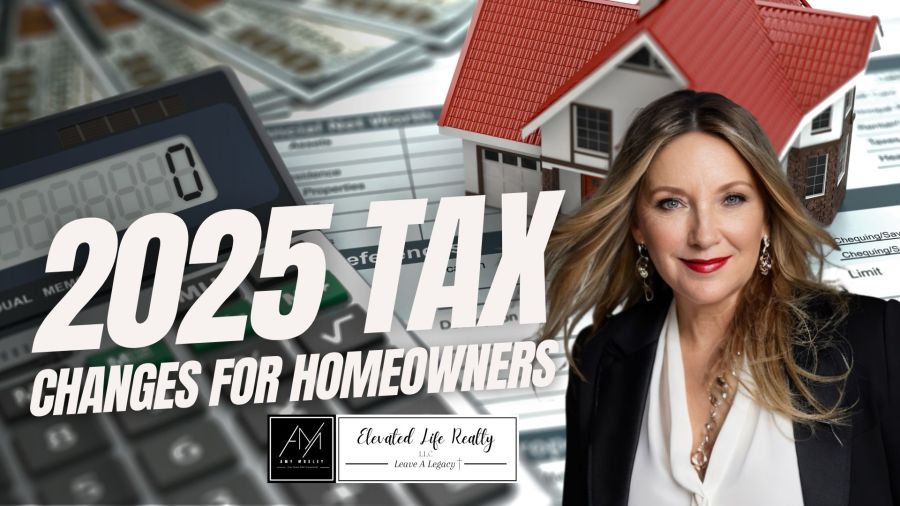
Understanding the 2025 Federal Tax Law: What Homeowners and Small Business Owners Need to Know
At Elevated Life Realty, LLC, we know that real estate decisions and tax planning often go hand in hand. With major updates introduced in the federal tax law for 2025, it’s the perfect time to understand how these changes affect your financial strategy—especially if you're buying, selling, or investing in Connecticut’s housing market. Below, we break down the most important takeaways for homeowners, small business owners, and real estate investors across our region.
A More Predictable Tax Landscape with Permanent Rates
The current tax brackets—ranging from 10% to 37%—are now permanent. For most families earning under $400,000 annually, this offers a stable, long-term framework for tax planning. While higher earners will see no additional rate reductions, this permanence allows more confident decisions moving into 2026 and beyond.
Standard Deductions Are On the Rise
Taxpayers will see an increase in standard deductions starting in 2025. Married couples filing jointly can now claim around $30,000, single filers will deduct $15,750, and head of household filers will also see a slight boost. These increases help more households lower taxable income—though many in high-tax areas may now benefit more from itemizing, especially with the next major change.
The SALT Deduction Shift: A Game Changer for High-Tax Areas
As illustrated in the image below, the SALT (State and Local Tax) deduction cap has been raised from $10,000 to $40,000 through 2029—a major shift that favors states like Connecticut where property and income taxes are significant.
For many local homeowners, this means the return of itemized deductions that may now surpass the standard deduction. Middle- and upper-middle-income households—especially those paying both property and state income taxes—stand to gain the most. Investors should also take note: the raised cap could drive increased demand in suburban and multifamily housing, as affordability paired with larger tax savings becomes more appealing.
This change is a standout for communities in Ridgefield, Brookfield, and similar towns where property taxes alone often exceed the old $10,000 limit. At Elevated Life Realty, we’re already guiding clients through this shift to help them optimize timing and tax benefits related to buying, selling, or holding property.
Seniors and Fixed-Income Households Receive Added Relief
For individuals aged 65 and older, an additional $6,000 deduction is now available. This can significantly reduce taxable income, though it begins phasing out at around $70,000 of annual income. If your primary income comes from Social Security, you may also owe little to no tax at all, depending on other income sources.
Family and Education Benefits See Major Enhancements
The Child Tax Credit has been raised to $2,200 per child, and families with children born between 2025 and 2028 may qualify for a MAGAC account—a federally backed savings plan that starts with a $1,000 government contribution and allows families to add up to $5,000 annually. These funds grow tax-free and can be used for education, business startup costs, or a first home purchase beginning at age 18.
In addition, 529 education plans can now be used for up to $20,000 per year on K–12 tuition, books, tutoring, and vocational school expenses. This expanded flexibility makes it easier for parents and grandparents to support educational needs with greater tax efficiency.
Homeownership and Vehicle Costs Get Tax Support
Two long-absent deductions have returned: mortgage insurance premiums (PMI) and vehicle loan interest. PMI is now deductible for those who itemize, making it more favorable for buyers who put down less than 20%. Likewise, interest on vehicle loans is deductible—if the vehicle is assembled in the U.S. These changes make home and vehicle ownership more affordable at a time when rates remain elevated.
Wage-Based Tax Breaks for Tipped Workers and Overtime Earners
Employees in service, hospitality, and hourly roles will see new savings. The first $25,000 of tipped income is now tax-free, and overtime income up to $12,500 (single) or $25,000 (joint) is also exempt from federal tax. Employers are expected to handle reporting, while employees enjoy larger net earnings.
Tax Advantages Expand for Small Business Owners and Investors
Business owners will benefit from a 23% Qualified Business Income (QBI) deduction, up from 20%. This reduces taxable profits for LLCs, sole proprietors, and other eligible entities. Investors in rental properties can also take advantage of 100% bonus depreciation for qualifying property improvements—lowering their tax liability for the year those expenses are incurred.
If you offer medical stipends or insurance to 1099 contractors, those payments can be reported as income and still deducted—creating a net-zero tax impact if structured correctly. Our team encourages you to consult with a tax advisor to ensure compliance while maximizing savings.
Charitable Giving Just Got Easier
Starting in 2026, taxpayers can deduct up to $1,000 (single) or $2,000 (married) in charitable contributions even without itemizing. This above-the-line deduction gives households more incentive to give, while still preserving itemized deductions for those with larger donation histories.
Limitations on Gambling Losses and International Transfers
Taxpayers who report gambling winnings may now only deduct losses up to 90% of the winnings. Additionally, a 3.5% excise tax will apply to money transferred to foreign accounts starting in 2026, though real estate transactions abroad are generally exempt.
Last Call for Electric Vehicle Credits
If you're considering purchasing an electric vehicle, the clock is ticking. Federal tax credits for EVs will expire after September 30, 2025, so now is the time to explore options before incentives fade.
Elevated Life Realty, LLC
The 2025 federal tax law brings expanded deductions, clearer guidelines, and more strategic opportunities for Connecticut homeowners and investors. Whether you're reviewing your real estate portfolio, planning to relocate, or growing a business, these updates can make a meaningful impact on your bottom line.
At Elevated Life Realty, we don’t just sell homes—we help clients navigate life’s transitions with confidence, clarity, and care. We work closely with your financial team to ensure every real estate decision is aligned with your greater goals.
7-18-2025

